EU launches phase one of Med migrant military mission

EU foreign ministers on Monday formally approved the launch of the first phase of a military operation to target people smugglers in the Mediterranean, officials said.
The initial taskforce of ships and aircraft will begin to conduct intelligence gathering missions within a week, officials said.
EU foreign affairs chief Federica Mogherini said the 28-nation bloc had responded quickly to the crisis washing up on its southern shores.
"I am impressed by the unanimity and speed with which we have put this together," Mogherini said as she arrived to chair the foreign ministers meeting.
The controversial decision comes after serious differences among member states over how to handle the tens of thousands of migrants crossing the Mediterranean, with Italy, Greece and Malta bearing the brunt of the burden.
The death of 800 people in April when their rickety boat sank forced the issue to the top of the political agenda months after the bloc late last year had actually scaled down its search and rescue operations off southern Italy to Rome's dismay.
EU leaders agreed at an emergency summit overshadowed by the disaster to formulate a comprehensive plan to tackle the problem at source, including a military option to go after the people traffickers working out of Libya.
The first phase of intelligence gathering is meant to be followed by active intervention to board and disable smuggler vessels and arrest the traffickers.
A third phase would extend these actions into Libyan territorial waters and possibly inside the country itself - a major and potentially dangerous commitment that some member states are reluctant to take on.
The proposals have sparked widespread concern amongst experts, human rights and aid groups who say that the proposals are not addressing the key root of the problem.
Criticism
UN Secretary-General Ban Ki-moon has said that destroying boats could affect the livelihoods of Libyan fishermen and force them to turn to smuggling to make up for the loss in livelihood, thereby exacerbating the situation.
MEE's Libya-based contributor Tom Wescott also warned against the proposals.
"The [plans] ignore the real problems on the ground, for either the Libyan authorities or the migrants, and seems very distant from reality. Boats are usually either old fishing vessels or inflatables. If the former, the vessel could be a bona fide fishing vessel and, if the latter is in the water, it’s likely already full of migrants. So, I’m not even sure what they are intending to bomb," she said via email.
Concerns about the lack of direction in the EU's dealing with the influx of migrants has been longstanding.
Back in April Camino Mortera-Martinez, a research fellow at the Center for European Reform in London, told the New York Times that "the EU hasn’t had a coherent immigration policy since forever, and the situation is getting worse since the Arab Spring".
To meet their reservations, the April summit agreed that advancing to Phases 2 and 3 would require a UN Security Council Resolution and agreement from Libya where rival factions are fighting for control and the internationally recognised government in Tobruk has warned against any military operations in Libyan waters against the smugglers.
But while Mogherini stressed that the EU is doing everything possible to broker an accord between the Libyan factions on a national unity government, progress has been slow. Russia, a permanent and veto-wielding UNSC member, has also made clear it wants to see Libyan consent before any resolution is passed, something which the Libyan's have been loathed to do as yet.
The Libyan ambassador to the UN, who is loyal to the Tobruk camp, told the BBC last month that the EU's intentions were unclear and "very worrying".
Some 100,000 migrants are believed to have crossed the Mediterranean so far this year, most of them landing in Italy, Greece and Malta, which all want their EU peers to share more of the burden. More than 1,800 people have also died trying to make the journey - a 20-fold increase on the same period in 2014.
The European Commission has proposed that 40,000 Syrian and Eritrean asylum-seekers who have arrived in Europe should be redistributed and that 20,000 Syrians living in camps outside Europe should be resettled across the 28-nation bloc, although the plan has been met with stiff opposition from some member states including Spain and the UK.
Broader response to crisis
The military mission, dubbed "EU NAVFOR Med," will initially involve five warships, two submarines, three maritime patrol aircraft, in addition to drones and helicopters, officials said.
A senior EU official who asked not to be named said that commanders were aware of the dangers in the operation, noting the presence of the Islamic State group in Libya and recent attacks on merchant shipping by the rival factions.
Mogherini said the mission would target the "business model of those who benefit from the misery of the migrants".
She stressed, however, that the military option should be seen as only part of a broader strategy to deal with a problem.
Stay informed with MEE's newsletters
Sign up to get the latest alerts, insights and analysis, starting with Turkey Unpacked
Middle East Eye delivers independent and unrivalled coverage and analysis of the Middle East, North Africa and beyond. To learn more about republishing this content and the associated fees, please fill out this form. More about MEE can be found here.





